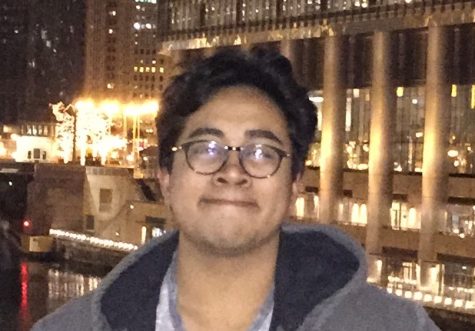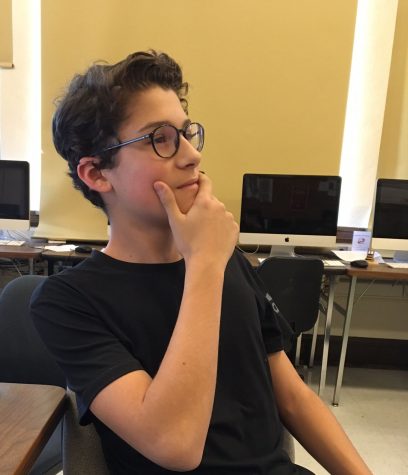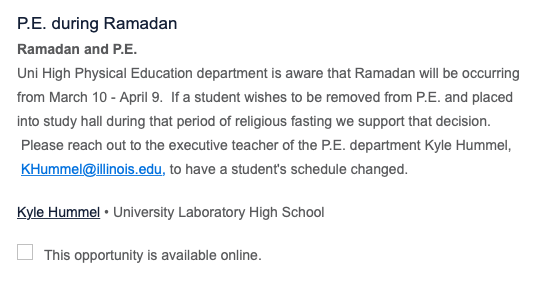Students and teachers take issue with aspects of task force report
Throughout the past week, Uni students and faculty alike have responded to the recently released Strategic Task Force Final Report. The report, which outlined various recommendations for Uni in terms of its academic affairs and financial system, was released in early April. Uni faculty learned about the report after school on Thursday, April 6 while Uni parents and students received it in an email from Director Jeff Walkington the following Friday morning.
Among students who were aware of the report, the recommendation that appeared to stand out to them was the elimination of the subfreshman class. Many students appeared to identify the report’s defining quality as being a document that was “getting rid of the subbies”.
Students had a lot to say about the recommendation. Some students, like freshman Steven Blanke, believed that the change could be harmful to students’ experiences. He pointed out that Uni has an “intensified curriculum,” and said that to “just throw people into that” wouldn’t be ideal. Similarly, senior Ally Sussman said that subfreshman year allowed her to adjust from a smaller workload to the regular workload at Uni. She said that if she had began her time at Uni with freshman year, it would have gone “very poorly.” Junior Jake Robbennolt claimed that it “loses sight of what is special about Uni.” Sophomore Krishna Subbiah and freshman Mustafa Syed said that the change seemed “interesting.” Syed said that as long as the overall student body size remains the same, he believes it will be “OK.”
Teachers also weighed in on the issue of subfreshman year. History teacher Chris Butler said that the team of teachers for subfreshman year has “done a great job of working together to make subbie year a transitional year” in terms of mental health and preparedness. He said that the effects of a period like subfreshman year can play through a student’s entire high school career. English teacher Steve Rayburn, who taught subfreshman year until 2014, said that without the transitional year, freshman students may not be able to operate at the same level that they currently do. German teacher Paul Weilmuenster said he believes it is a good “bridge year” for students to “acclimate to Uni,” because most subfreshman grades are not counted as part of the high school transcript.
Another common topic of conversation was the 15 students that would be added to each incoming freshman class in place of the eliminated subfreshmen. Particularly contentious were the proposed ten spots reserved for “recruitment and retention.” The “recruitment and retention” section of the report described spots reserved for students who “otherwise did not make the admissions cut” but whose admission could help with obtaining and keeping University faculty.
Many students believed that this proposal contradicted Uni’s values and the recommendations set forth by the report itself. During a discussion in Current Events club, junior Roma Mehta pointed out that several Uni students were already related to University faculty. At the same meeting, sophomore Nathalie Stein said that Uni already has a reputation of having an exclusive community and that the change would only further perpetuate that. Sophomore Solomia Dzhaman said that it “undermined the credibility of Uni,” because students might question whether their peers got in on merit or because of their connections.
Junior Elizabeth Atkinson believed other recommendations could have a similar effect, for example, with regards to the preferential admissions treatment for siblings, people might assume that a student was only admitted because their sibling attends Uni.
Teachers appeared to be more concerned with the issue of “gifted” than the students were. Rayburn was intrigued by the idea of becoming a school for “gifted” education rather than a preparatory school, but argued for more extensive elaboration of the term. One potential definition he offered was admitting students that excel in one particular area, like playing the tuba or biology. History teacher Bill Sutton found trying to define “gifted” amusing and mentioned that they had attempted to define the word. However, he said that a definition should be broad and recognize many different gifts. He said the current environment at Uni would not be conducive to such a broad definition, since a student who might excel at archery, for example, would have no place if they were ill-suited for math or English.
Rayburn also saw the addition of fifteen students to each class as potentially difficult. He believed it would “change the nature of Uni,” due to the greater amount of time and effort teachers would have to put in to compensate for these new students.
Another commonly discussed topic was that of university integration. The report recommends integrating the university more into Uni curriculum and taking advantage of university resources. Some of the ways they suggest doing that is by increasing concurrent enrollment senior year and creating a STEM program specifically for female students.
History teacher Ben Leff, who is also a Uni alum, wondered whether having more university integration senior year could potentially worsen a student’s final school year at Uni. Going out on campus and not being in the same building for all hours of the day could reduce the intimacy and close friendships many Uni students value. However, he acknowledged that some university integration could be beneficial. For example, he believed allowing teachers easy access to various grants and other opportunities at the university could be very helpful.
Butler likened the idea of more senior year university classes to a banner reading “Hurry up and die,” saying that such a program is evidence of too much emphasis on a person’s next chapter in their life and calling it “too much too fast,” while still understanding that some students may elect to take classes that aren’t available at Uni.
One junior questioned the effectiveness of attempting to implement a STEM program for female students, saying that it targeted girls too late in their academic career.
Overall, students and teachers alike seem to be questioning how much the report takes into account their needs and values. Sutton says that “very little” of the report refers to “the good the school is doing for students,” which he believes should be a top priority.

I started journalism first semester of junior year. In my free time, I like to read and write. I also like superheroes and video games. My favorite superhero...

I am a sophomore at Uni High. I like long walks on the beach and playing soccer with my friends. I like writing about sports and current events.
I'm a junior and this is my first semester of Journalism. In my free time I enjoy drawing, playing sports, and doing math.



Karen Schmeckpeper • Apr 30, 2017 at 2:48 pm
YES to a Subfreshman class. I attended UNI under slightly false pretenses (my twin scored high enough but I did not. My folks said both or nothing. SO we both attended.).
I was not a stellar student but that year was so informative and formative. We stayed at UNI until my mom went to med school in 68 at University of Oklahoma. We entered as juniors in Oklahoma City public schools with the advantage of certain educational expectations to guide us acquired at UNI.
I try to imagine this transition with just two years at UNI instead of three complicated especially by this entire middle school debacle that children endure these days: I am reminded of an important event. The Amish and UniHigh student field trips. Our class went to their one room all grades schoolhouse. It was a good day for baseball. They visited UNI. All of them. All ages. In my mind maybe Catching a Year earlier is just as valid a concern…
I would not trade my sub freshman year away. I must say I think cutting that year is a very bad idea. Than you for the forum.
Karen Schmeckpeper • Apr 30, 2017 at 2:50 pm
Pardon, that was thank you for the forum.